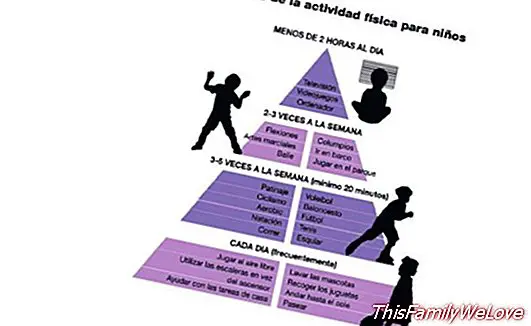Benefits of sport for children
The first thing that parents have to do is to make us aware that physical exercise is vital for our children, not only as a source of health but also as an essential complement when developing virtues such as the ability to exert, overcome or constancy.
"It is indisputable that exercise and sports bring great benefits to our children, not only for their physical and mental health, but also because it prevents future problems. Is it not part of one of the solutions to conflicts related to the bottle? , school failure, the misuse of free time, etc. "Sport is equal to physical and mental health at any age," says our collaborator Ricardo Márquez.
Benefits and positive factors of sport for children
- Socialize and make the child integrate and know how to act in a group with a common goal.
- Educates respect for authority, because the child assumes by imposition of the script, the rules and decisions of both the coach and the referee.
- Help improve self-esteem because when training, we become more competent in our sports discipline.
- Release tensions and responds to the need for movement that a child needs.
- Create healthy habits for the future.
- Develop the effort capacity, overcoming laziness before getting up early to play, training with cold or heat, doing the exercises that I like and those that I do not like, playing in the position they tell me, etc.
- Help to properly organize free time.
- Create bonds of friendship and fidelity. "I can not leave my team hanging".
- From the physical point of view, it is an essential part of a harmonious growth, developing physical qualities (strength, endurance, agility, coordination and flexibility) and specific skills of each sport.
- Improvement of cardiorespiratory and vascular function, decreases the level of triglycerides in blood and reserves in adipose tissue.
- Contributes to muscle and bone development.
- Promotes perceptual-motor improvements intimately related to coordination.
Guidelines to help children with little athletes

The Americanheart NGO advises a series of guidelines to help children who are not very athletic:
- Some children are ashamed to play sports because they think they are not good enough. If that is the problem, look for moments to train together. This can help you develop self-confidence.
- Other children just do not like sports competition. That's not too much of a problem, since there are thousands of different ways to do physical exercise: for example, swimming, riding, biking, skating, walking at a fast pace, etc. Discover what your child is interested in.
- Do not transform the exercise into a punishment. If you force your child, it may increase their resentment and resistance. Try using physical activity to counteract another activity that your child does not want to do. For example, to incorporate to the daily routine to ride in bicycle during 30 minutes before beginning to do the duties of the school or simply to walk fast, to raise the stairs etc.
- The collective sport brings many psychological benefits, as long as it does not involve torture for the child: teamwork, learn from triumphs and defeats, tolerance to frustration, strengthen friendships. Make it, at least, prove it.
- If the whole family plays sports, the child will feel more motivated and with more desire to do him also exercise. It can even be playing hide-and-seek on weekends, long walks in the countryside, going to the mountains, aerobics with music at home. Everyone will benefit from the exercise and enjoy the time they spend with the family. Also, if you take care of yourself, those who love you will thank you.
Jaime Márquez
Adviser: Ricardo Márquez. Bachelor in Physical Education (INEF) and professor.
You may also like:
- How to motivate children with little athletes
- How to teach children to watch television
- School competition, the role of parents
- How to choose the sport for your child
- Recommended sports for Preschool children
- The value of effort in early childhood education




